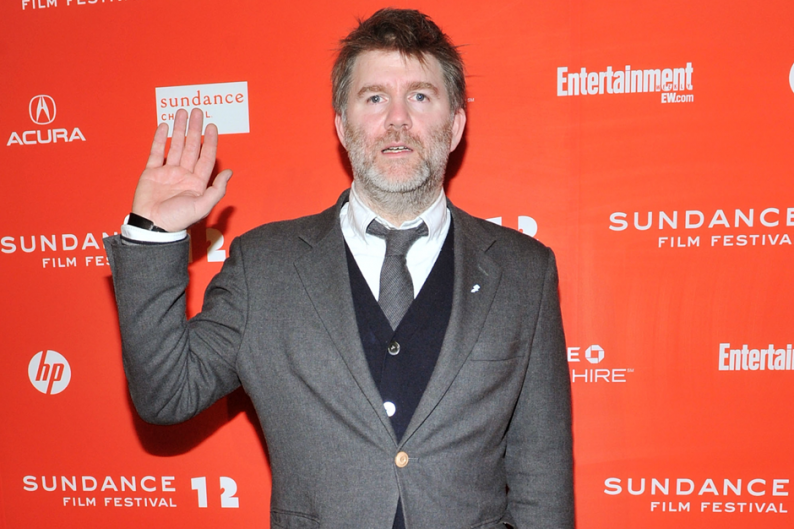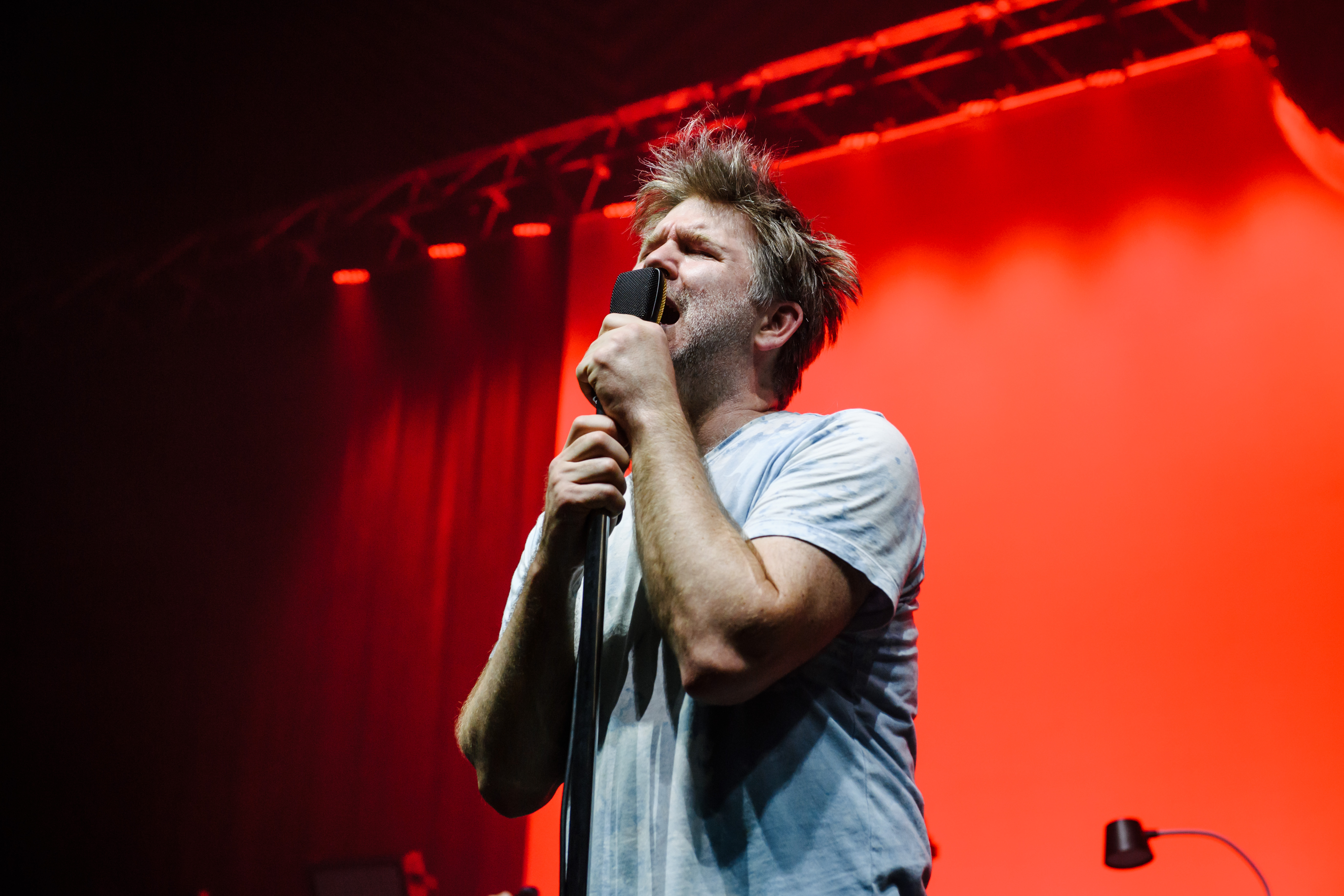More From Sundance 2012:
• Reel Talk: SPIN’s Shots From Sundance 2012
• SPIN @ Sundance: Can Sean Penn Actually Play Robert Smith?
• SPIN @ Sundance: Andy Samberg Tries To Be Unfunny
• SPIN’s 20 Most Anticipated Films of Sundance 2012
No, SPIN would never seriously tell James Murphy to shut up — quite the opposite. Last night’s midnight screening of Shut Up and Play the Hits was the highlight of our day, the second best thing to having attended LCD Soundsystem’s final show at Madison Square Garden. Thanks to directors Will Lovelace and Dylan Southern, who directed this concert documentary, we can already be nostalgic for a moment from less than a year ago and remember it as being visually arresting and monumental and profound. And for many of the crying/dancing/orgiastic fans standing in the round of the venue, they can see themselves as part of this experience — Southern and Lovelace used 13 cameras to capture the scene at MSG that April night, several of which were located in the ceiling.
But the film wouldn’t have been about more than just great footage if not for two things: First, SPIN contributor Chuck Klosterman, whose interview with Murphy provides narrative context for the film. In responding to the author’s perceptive assessments and probing questions, Murphy must confront his own pretensions, failures and the meaning of LCD Soundsystem, which he does articulately (stopping is his greatest failure, he says). And, also, credit is due to Petunia, Murphy’s Boston terrier, whose ambivalence to his owner’s accomplishments the next day represents the singer’s humbling. Now he’s just like the rest of us, walking the dog and making coffee, right?
Yeah, no, not really. As Shut Up cycles through “All My Friends” and “Losing My Edge” and the cover of Harry Nilsson’s “Jump Into the Fire,” Murphy’s absolute power as a frontman is revealed. The audience clapped and leg-danced through the songs as if this were a legitimate show. Other scenes find him tearing up and trying to make sense of his new life, which consists of trying to work the coffee maker — it seemed like some of these might have been staged, but they’re nonetheless funny. And what navel-gazing there is comes across as contemplative rather than self-important. For everyone at Park City’s Egyptian Theatre, it was a thrilling experience, and like LCD themselves, one best enjoyed until the wee hours of the morning. Check back over the next few days for SPIN’s interview with James Murphy.Reel Talk: Check out shots of Drake on the mic, Grouplove onstage, and Lil Jon on the slopes from Sundance 2012.
Eric Wareheim, Jeffrey Jensen, Alexia Rasmussen, Kate Lyn Sheil, Rick Alverson, Tim Heidecker, and James Murphy attend The Comedy premiere on January 21, 2012 in Park City, Utah. (Photo: Todd Oren/Getty)
And speaking of Murphy, SPIN sat down with The Comedy‘s director Rick Alverson, and stars Tim Heidecker and Eric Wareheim yesterday to discuss their film, in which Murphy costars. As we reported, it’s a love-it-or-hate-it kind of a project, deliberately provocative in its improvisational cruelty. Alverson defends The Comedy, not that he would use the word defend, as “a commentary on a larger desensitization. It’s about voyeurism and the desire to be engaged in a way that is less and less accessible to us.” But Alverson was quick to correct the interpretation that this was an attack on hipsters: “That’s a very narrow-minded way for people to approach the film, probably a very safe way. It’s not an indictment of people who live a particular way. Williamsburg [Brooklyn] is a cultural nucleus and the people who live there believe that it’s a cultural nucleus so it’s a heightened example of the particular state of contemporary culture in America.” Heidecker added, “There’s an absence of morality and social structure. There’s highly educated, very progressive, open minded people, but that leaves them in kind of vacuum. ‘I’m not religious, I don’t have a strong foundation in my government, I’m not really attached to anything.’ ” Which is where James Murphy comes in. “He obviously works within that world,” Alverson explained, before Wareheim cut him off: “Let’s not mince words: He’s king of the hipsters.” But so these guys do realize that so-called hipsters — their legions are many, but few will self identify — will be the first group of people to embrace this movie about a post-everything environment where the characters are contrarian and ironic, right? “Yeah, I definitely think they’ll embrace it,” says Wareheim. “Those people can laugh at themselves. Nobody’s going to be offended by it.” He has a point. We’re post-offended.
(Photo: Charles Peterson)
Finally, Ice-T’s Something From Nothing: The Art of Rap is a thorough documentary that, in the hands of anybody else, might have been totally dorky. Actually, it’s still dorky, but who better to ask Raekwon “What constitutes wackness?” Who better to ask Big Daddy Kane the difference between being a rapper and an MC. Kane’s answer: “A rapper is just someone who rhymes. Dr. Seuss is a rapper. But an MC will get up there and use the word quagmire and people are like, “Quagmire? What the fuck?” In getting Eminem, Kanye, Melle Mel, Bun B, Q-Tip, Dr. Dre, Salt (of Salt-N-Pepa) and many more to talk about how they write verses, Ice-T has created a hip-hop primer, but nothing as dry or institutional as that sounds. The Law & Order star’s charisma comes through as he grins alongside some of his friends and admits to forgetting the words to his own songs onstage (in which case he pretends that the mic went out or sticks it in the face of the super fan in the front row who knows all the lyrics). The obvious bonus to having Ice-T conduct the interviews is that everyone is really comfortable around him so the scenes, many of which are shot on the street or more natural surroundings, feel very accessible and organic and a normally wary, unsmiling subject like Eminem really opens up and shows enthusiasm the craft.
From the beginning, he says the documentary is purely about skill, not the beefs or the bling. The only time he hits on a serious subject is when he asks his colleagues why they think hip-hop hasn’t commanded the respect that jazz and blues has. He gets several different answers: Unwillingness of rappers to offer respect to the forebears, an inability to properly listen to the language and, from Nas, the opinion that nobody wants this street music in their living room. He adds that he’s a grown man so he can’t wear his pants low anymore, but he’ll hike them down just a little to “annoy you stiff motherfuckers.” After a while, the format gets a little repetitive and it would have been nice if Ice-T had found a few more ladies. But the film never comes across as exclusive, only passionate.
(Photo: Joe Scarnici/Getty Images for T-Mobile)
Any conversation about Spike Lee’s Red Hook Summer should wait until SPIN gets an interview with the director, which is scheduled to happen later today, when we can ask him about the return of Do the Right Thing‘s Mookie and, also, what the hell this movie is about. Gentrification? Religion? iPads? Lee can shed some light.





